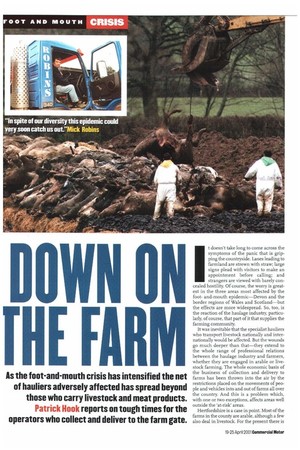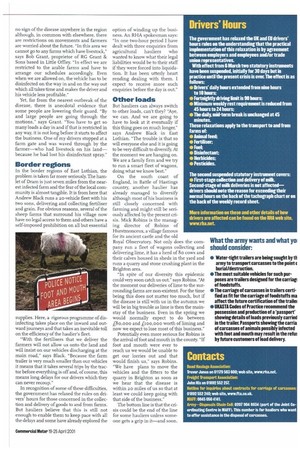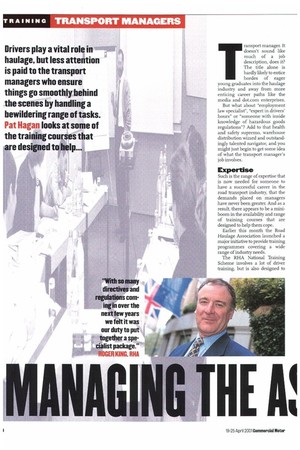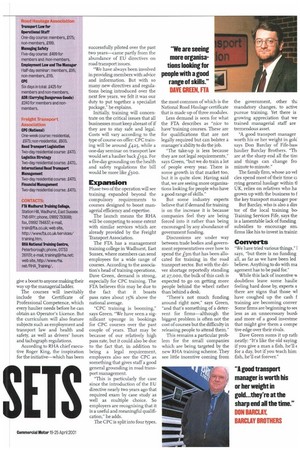OYIN
Page 40

Page 41

Page 42

Page 43

If you've noticed an error in this article please click here to report it so we can fix it.
E FA
t doesn't take long to come across the symptoms of the panic that is gripping the countryside. Lanes leading to farmland are strewn with straw; large signs plead with visitors to make an appointment before calling; and strangers are viewed with barely concealed hostility. Of course, the worry is greatest in the three areas most affected by the footand-mouth epidemic—Devon and the border regions of Wales and Scotland—but the effects are more widespread. So, too, is the reaction of the haulage industry, particularly, of course, that part of it that supplies the fanning community.
It was inevitable that the specialist hauliers who transport livestock nationally and internationally would be affected. But the wounds go much deeper than that—they extend to the whole range of professional relations between the haulage industry and farmers, whether they are engaged in arable or livestock farming. The whole economic basis of the business of collection and delivery to farms has been thrown into the air by the restrictions placed on the movements of people and vehicles into and out of farms all over the country. And this is a problem which, with one or two exceptions, affects areas well outside the 'at-risk' areas.
Hertfordshire is a case in point. Most of the farms in the county are arable, although a few also deal in livestock. For the present there is no sign of the disease anywhere in the region although, in common with elsewhere, there are restrictions on movements and farmers are worried about the future. "In this area we cannot go to any farms which have livestock," says Bob Grant, proprietor of RG Grant 8, Sons based in Little Offley. "In effect we are restricted to the arable farms and have to arrange our schedules accordingly. Even when we are allowed on, the vehicle has to be disinfected on the way in and on the way out which all takes time and makes the driver and his vehicle less profitable."
Yet, far from the nearest outbreak of the disease, there is anecdotal evidence that some people are lowering their guard. "By and large people are going through the motions," says Grant. "You have to get so many loads a day in and if that is restricted in any way, it is not long before it starts to affect the business. One of my drivers stopped at a farm gate and was waved through by the farmer—who had livestock on his land— because he had lost his disinfectant spray."
Border regions
In the border regions of East Lothian, the problem is taken far more seriously. The hamlet of Dram is just seven miles from the nearest infected farm and the fear of the local community is almost tangible. It is from here that Andrew Black runs a 2o-vehicle fleet with his two sons, delivering and collecting fertiliser and grain. For obvious reasons, several of the sheep farms that surround his village now have no legal access to them and others have a self-imposed prohibition on all but essential supplies. Here, a rigorous programme of disinfecting takes place on the inward and outward journeys and that takes an inevitable toll on the efficiency of the haulier's fleet.
"With the fertilisers that we deliver the farmers will not allow us onto the land and will insist on our vehicles discharging at the main road," says Black. "Because the farm trailer is very much smaller than our vehicles it means that it takes several trips by the tractor before everything is off and, of course, this means long delays for our drivers which they can never recoup."
In recognition of some of these difficulties, the government has relaxed the rules on drivers' hours for those concerned in the collection and delivery of goods to and from farms. But hauliers believe that this is still not enough to enable them to keep pace with all the delays and some have already explored the option of winding up the business. An RHA spokesman says: "In one two-hour period I have dealt with three enquiries from agricultural hauliers who wanted to know what their legal liabilities would be to their staff if they were forced into liquidation. It has been utterly heart rending dealing with them. I expect to receive more such enquiries before the day is out."
Other loads
But hauliers can always switch to other loads, can't they? "Aye, we can. And we are going to have to look at it eventually if this thing goes on much longer," says Andrew Black in East Lothian. "The trouble is that so will everyone else and it is going to be very difficult to diversify. At the moment we are hanging on. We are a family firm and we try to run a smart fleet of wagons, doing what we know best."
On the south coast of England, in Battle of Hastings country, another haulier has already managed to diversify although most of his business is still closely concerned with farming and might still be seriously affected by the present crisis. Mick Robins is the managing director of Robins of Hurstrnonceux, a village famous for its ancient castle and the old Royal Observatory. Not only does the company run a fleet of wagons collecting and delivering lime, it has a herd of 8o cows and their calves housed in sheds in the yard and runs a quarry and stone crushing plant in the Brighton area.
"In spite of our diversity this epidemic could very soon catch us out," says Robins. "At the moment our deliveries of lime to the surrounding farms are non-existent. For the time being this does not matter too much, but if the disease is still with us in the autumn we will be in big trouble as lime is then the mainstay of the business. Even in the spring we would normally expect to do between go,000 and £100,000 worth of liming and now we expect to lose most of this business."
Potentially even more serious for Robins is the arrival of foot and mouth in the county. "If foot and mouth were ever to reach us we would be unable to get our lorries out and that would finish us," says Robins. "We have plans to move the vehicles and the fitters to the quarry in Brighton as soon as we hear that the disease is within 20 miles of us so that at least we could keep going with that side of the business."
The bottom line is that the crisis could be the end of the line for some hauliers unless someone gets a grip in it—and soon. ransport manager. It doesn't sound like much of a job description, does it? The title alone is hardly likely to entice hordes of eager young graduates into the haulage industry and away from more enticing career paths like the media and dot.com enterprises.
But what about "employment law specialist", "expert in drivers' hours" or "someone with inside knowledge of hazardous goods regulations"? Add to that health and safety supremo, warehouse distribution wizard and outstandingly talented navigator, and you might just begin to get some idea of what the transport manager's job involves.
Expertise
Such is the range of expertise that is now needed for someone to have a successful career in the road transport industry, that the demands placed on managers have never been greater. And as a result, there appears to be a miniboom in the availability and range of training courses that are designed to help them cope.
Earlier this month the Road Haulage Association launched a major initiative to provide training programmes covering a wide range of industry needs.
The RHA National Training Scheme involves a lot of driver training, but is also designed to give a boost to anyone making their way up the managerial ladder.
The courses will inevitably include the Certificate of Professional Competence, which every haulier needs before he can obtain an Operator's Licence. But the curriculum will also feature subjects such as employment and transport law and health and safety, as well as drivers' hours and tachograph regulations.
According to RHA chief executive Roger King, the inspiration for the initiative—which has been successfully piloted over the past two years—came partly from the abundance of EU directives on road transport issues.
"We have always been involved in providing members with advice and information. But with so many new directives and regulations being introduced over the next few years, we felt it was our duty to put together a specialist package," he explains.
Initially, training will concentrate on the critical issues that all businesses must keep abreast of if they are to stay safe and legal. Costs will vary according to the type of course on offer: CPC training will be around £425, while a one-day seminar on transport law would set a haulier back £192 For a five-day grounding on the health and safety regulations the bill would be more like ktact.
Expansion
Phase two of the operation will see training expanded beyond the compulsory requirements to courses designed to boost managerial efficiency and expertise.
The launch means the RHA will be competing to some extent with similar services which are already provided by the Freight Transport Association, The FTA has a management training college in Wadhurst, East Sussex, where members can send employees for a wide range of courses. According to the association's head of training operations, Dave Green, demand is strong, especially for CPC training. The ETA believes this may be due to the fact that it boasts pass rates about 15% above the national average.
"CPC training is booming," says Green. "We have seen a significant upsurge in bookings for CPC courses over the past couple of years. That may be because of our relatively high pass rate, but it could also be due to the fact that, in addition to being a legal requirement, employers also see the CPC as something that gives staff a good general grounding in road transport management.
"This is particularly the case since the introduction of the EU directive nearly two years ago that required exam by case study as well as multiple choice. So employers are recognising that it is a useful and meaningful qualification," he adds.
The CPC is split into four types, the most common of which is the National Road Haulage certificate that is made up of three modules.
Less demand is seen for what the FTA describes as "nice to have"training courses. These are for qualifications that are not legally required but can bolster a manager's ability to do the job.
"The take-up is less because they are not legal requirements," says Green, "but we do train a lot of people every year. There is some growth in that market too, but it is quite slow. Having said that, we are seeing more organisations looking for people who have a good range of skills."
But some industry experts believe that if demand for training is on the increase it is because companies feel they are being forced into it rather than being encouraged by any abundance of government funding.
Discussions are under way between trade bodies and government representatives over how to spend the Lim that has been allocated for training in the road transport sector. But with the driver shortage reportedly standing at 27,000, the bulk of this cash is expected to go on getting more people behind the wheel rather than behind a desk.
"There's not much funding around right now," says Green, "and that's something of a deterrent for firms—although the biggest problem is often not the cost of courses but the difficulty in releasing people to attend them."
This remains a particular problem for the small companies which are being targeted by the new RHA training scheme. They see little incentive coming from the government, other thz mandatory changes, to active pursue training. Yet there is growing appreciation that we trained managerial staff are tremendous asset.
"A good transport manager worth his or her weight in gok says Don Barclay of Fife-bas( haulier Barclay Brothers. "Th are at the sharp end all the tinn and things can change fro minute to minute."
The family firm, whose 2o vol cks spend most of their time a rying general haulage within t] UK, relies on relatives who ha. grown up with the business to f the key transport manager post
But Barclay, who is also a dirt tor of the local training bot Training Services Fife, says the is a lamentable lack of ftuiding subsidies to encourage smi firms like his to invest in trainin
Converts
"We have tried various things," I says, "but there is no funding all, as far as we have been led believe. Anything to do with ma agement has to be paid for."
While this lack of incentive w doubtless leave some haulie feeling hard done by, experts s there are signs that those wl have coughed up the cash I training are becoming conver Some firms are beginning to sec less as an unnecessary bur& and more of a good investrne that might give them a compe five edge over their rivals.
Dave Green sums it up rath neatly: "It's like the old saying if you give a man a fish, he'll e for a day, but if you teach him fish, he'll eat forever."




























































































